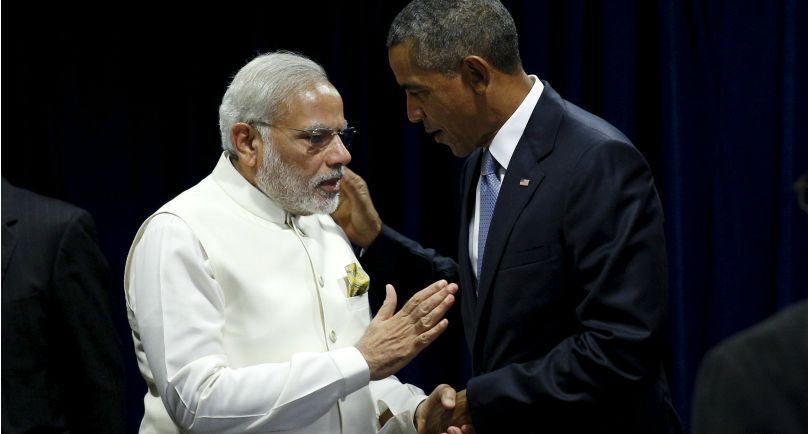Image: U.S. President Barack Obama shakes hands with India’s Prime Minister Narendra Modi during their meeting at the United Nations General Assembly in New York September 28, 2015. REUTERS/Kevin Lamarque
By David Brunnstrom and Jeff Mason
UNITED NATIONS (Reuters) – India’s Prime Minister Narendra Modi met U.S. President Barack Obama and France and Britain’s leaders on Monday, and called for a climate change agenda from upcoming global talks in Paris that helps developing countries with access to finance and technology.
Modi said after meeting Obama that he and the American president shared an “uncompromising” commitment to fighting climate change without hurting development. He thanked Obama for responding positively to his call for a global public partnership to develop sources of clean energy.
“We look forward to (a) comprehensive and concrete outcome in Paris with a positive agenda on combating climate change which also focuses on access to finance and technology for the developing world, especially the poor countries and small island states,” Modi said.
Close to 200 countries will meet in Paris in December and try to hammer out a deal to slow manmade climate change by aiming to keep temperatures below a ceiling of 2 degrees Celsius above pre-industrial levels.
India is one of the few large economies of the world that has not yet submitted its strategy to the United Nations outlining how it plans to address climate change. The deadline for these commitments, known as Intended Nationally Determined Contributions, or INDCs, is this week.
Last week, China, the world’s biggest greenhouse gas emitter, renewed its commitment to bring its spiraling emissions to a peak by “around 2030”.
Environment Minister Prakash Javadekar told Reuters last week that India’s peak year would be a “distant” one because it needed to fight poverty and give the more than 300 million Indians still living without power access to energy.
Javadekar said India would commit to reducing emissions if the developed world could provide more technology and finance to combat global warming.
After their talks on the sidelines of the U.N. General Assembly, Obama said he was encouraged by Modi’s “aggressive” commitment to clean energy and stressed the importance of India taking “a leadership role” in Paris, saying this would “set the tone not just for today but for decades to come.”
A concrete plan on how to raise $100 billion a year to help developing countries cope with and combat climate change will be a key factor determining the success of a Paris climate agreement.
World finance ministers will meet on Oct. 7-8 in Lima, Peru, to try to agree on that framework.
Indian Foreign Ministry spokesman Vikas Swarup said Modi made “very clear” to Obama, British Prime Minister David Cameron and French President Francois Hollande “that the current climate of negativism was not a useful factor as we approach … Paris.
“Rather than just putting pressure … he said it would have been far better if we had a positive agenda which enabled countries to go in for more sustainable parts of development by providing them with finance and the relevant technology.”
Swarap said Modi’s meeting with Hollande was joined by Microsoft founder Bill Gates, bringing the private sector into the debate.
“With people like him getting involved, there is a real possibility of there being private-sector partnerships on the technology side,” the spokesman said.
Swarap also said Modi told the leaders India had sought U.N. permission to declare its carbon emission commitments a day late on Oct. 2, because this was the birthday of Indian independence hero Mahatma Gandhi.
“(Gandhi) was a person who was passionately committed to the cause of the environment, who was a champion of sustainable development,” Swarap said. “If we declare our INDCs on Oct. 2, then it adds a very significant moral dimension as well to our commitment.”
Swarap said “there was a lot of appreciation for this point of view” from Obama and the other leaders.
(Reporting by Jeff Mason, David Brunnstrom and Valerie Volcovici; Editing by Susan Heavey and Jonathan Oatis)
Copyright 2015 Thomson Reuters. Click for Restrictions.


